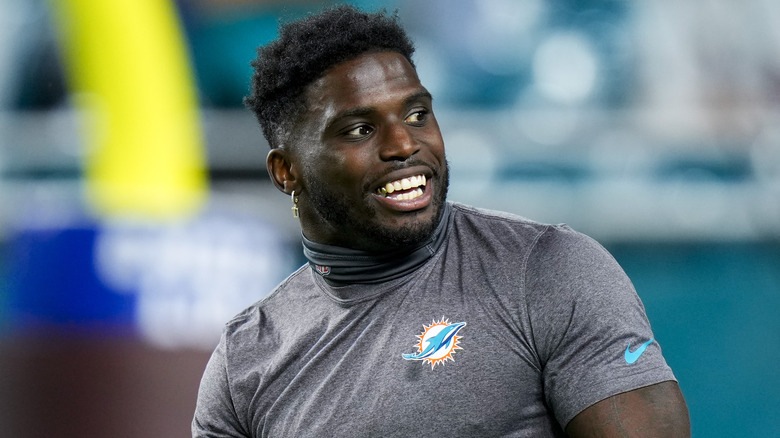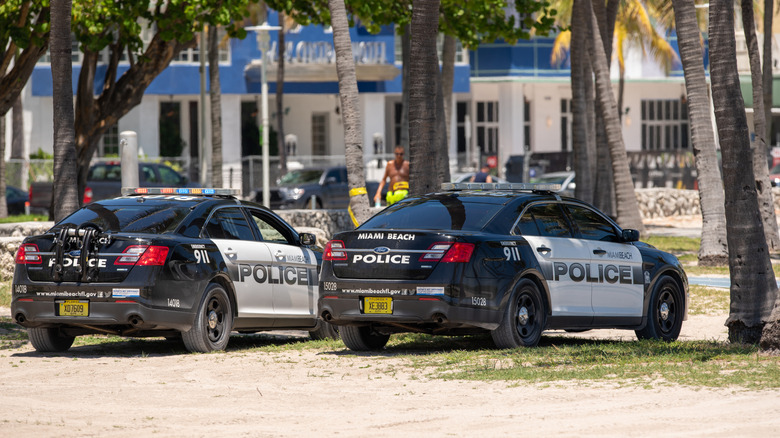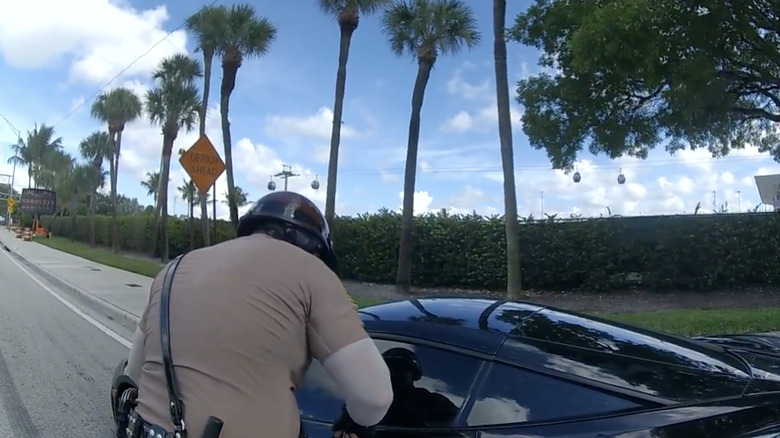Do You Have To Roll Your Car Windows Down For Police During A Traffic Stop? It's Complicated
Millions of traffic stops are made throughout the United States each year and most don't turn into headlines, but when they do, it typically involves a person of color and a law officer accused of abusing their power. Another such controversial issue arose on September 8, 2004, when Miami Dolphins wide receiver Tyreek Hill was pulled over for speeding while on his way to Hard Rock Stadium to play against the Jacksonville Jaguars. The altercation was made public after Miami-Dade police officers pulled him out of his vehicle before forcing him down to the ground and handcuffing him.
Fortunately, things smoothed out after a while and he went on to score an 80-yard touchdown against the Jaguars that day, but the incident brought to light the now too-familiar issue of Black people being pulled over by police and things escalating. In Hill's case, police body cam video posted on X (formerly Twitter) shows that the altercation between Hill and the police stemmed from Hill refusing to lower his window after the initial interaction with police.
Grunge spoke with attorney Tray Gober, the managing partner at Austin, Texas-based law firm Lee, Gober & Reyna, to find out more about the law around keeping your window open during a traffic stop. According to Gober, "Generally, during a traffic stop, motorists are required to roll down their windows enough to facilitate clear communication with the police officer. This is necessary for both parties to exchange information and documentation safely and effectively. However, there is no universal rule that mandates the window must be rolled down completely."
Laws around keeping the window rolled down are murky
That said, the rules are going to be a little different depending on where you are pulled over. "States and localities differ in what they require when it comes to windows and traffic stops," Tray Gober said. Tyreek Hill was pulled over in Florida where the law requires people to roll their windows down during a traffic stop. However, whether or not you have to keep your window down the entire duration is a bit murky.
In the police body cam video, Hill initially rolls down his window for the officer and hands him what presumably was his license and registration. The officer says, "Why don't you have your seatbelt on?" Hill replies, "Don't knock on my window like that." The two continue with a calm enough exchange, but eventually, Hill says, "Do what you gotta do," and rolls his window back up. The officer then knocks multiple times on the window and tells Hill to keep his window down, and from there, things quickly escalate. But it's plausible that Hill didn't think he was doing anything wrong because he'd already given the officer his legal documents.
"Once the necessary documents have been exchanged, there isn't a legal requirement to keep the window fully down," Gober said. "Motorists can partially raise the window for personal comfort while ensuring they continue to comply with the officer's instructions and maintain clear communication."
Gober pointed out, though, that if there is dark tint on the windows the officer would want the windows down to "ensure visibility and safety during the interaction." If it's nighttime, an officer would likely expect windows to stay open for similar reasons.
Dark tint and a fully rolled up window
While the incident happened on a sunny morning, the car's tint was a bit dark, and it was fully rolled up, not partially. Tyreek Hill did not immediately roll his window back down when the officer told him to. A few seconds passed and the officer repeated the order, adding that if he didn't comply the officer was going to "get [him] out of the car." Moments later he said, "As a matter of fact get out of the car right now."
Again, Hill was slow to comply with two officers now repeatedly telling him to get out before they opened the door and physically pulled him out, forcing him down on the ground. Hill was on the phone with Dolphins Director of Team Security at the time, Drew Brooks, and told him that he was "getting arrested." Per The New York Times, Hill said the reason he rolled up the window in the first place was to call Brooks.
Tray Gober said both Hill and the arresting officer handled things poorly. "After watching video footage of the traffic stop of Tyreek Hill, it seems both parties are at fault for the escalation," he said. "Mr. Hill exhibited a confrontational attitude, and things got heated. The police officer failed to de-escalate and instead took part in aggravating the matter. In the end, Mr. Hill had a right to assert his rights but sometimes just because we can, doesn't mean we should. The officer unnecessarily escalated the matter without just cause. The officer's own words demonstrate that he was asserting force over Mr. Hill to teach him a lesson, rather than out of a concern for officer safety. Everyone can learn from this incident."


